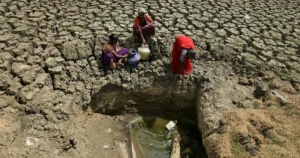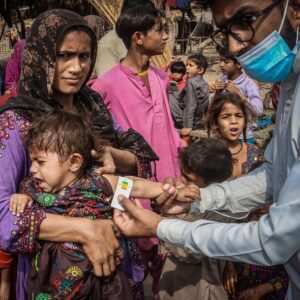Balochistan, Pakistan’s largest province, is facing an intensifying climate crisis, threatening the livelihoods of its people and its fragile ecosystems. While much attention is often given to glacial melting or floods in other regions of Pakistan, Balochistan is enduring prolonged droughts, extreme temperatures, and water scarcity. These harsh realities are taking a toll on agriculture, water supplies, and public health.
Balochistan’s Environmental Challenges
The province’s arid landscape makes it particularly vulnerable to climate change. Extreme weather events, including flash floods and scorching heatwaves, are becoming more frequent and severe. Prolonged droughts are the norm, not the exception, and are devastating the region’s agricultural sector. Farmers in Balochistan, once dependent on seasonal rains and groundwater for irrigation, are now struggling with the effects of erratic rainfall and depleting water reserves.

Crops like apples, peaches, and pomegranates—once a hallmark of Balochistan’s agriculture—are producing lower yields due to changing weather patterns. As these yields decline, food insecurity increases, exacerbating economic hardships. Livestock, crucial for the province’s pastoral communities, are dying off due to dwindling grazing areas and scarce water, further worsening poverty.
Additionally, the rise in temperatures has led to an increase in heat-related illnesses, with local communities suffering from poor access to healthcare. As malnutrition rises due to failing crops, the health of the population continues to deteriorate, creating an urgent need for solutions.
Limited Awareness and Preparation
Despite these growing challenges, climate awareness and adaptation strategies remain limited in Balochistan. Rural communities, which make up a significant portion of the province’s population, have minimal access to education and resources, leaving them unprepared for extreme climate events. Moreover, the government’s response has been inadequate, with little investment in sustainable infrastructure, climate education, or water conservation systems.
The lack of knowledge and resources contributes to higher casualties during natural disasters, and the region’s remote location further isolates it from national climate discussions. As Balochistan continues to be sidelined, the climate crisis deepens, affecting not only the region but the entire nation.

The Human Toll: Health and Livelihoods
 The climate crisis has had severe repercussions on the health and well-being of the local population. As temperatures soar, heat-related illnesses are on the rise, with the lack of healthcare infrastructure leaving many without access to essential treatments. Malnutrition is rampant as crop failures and food shortages become more common, compounding the already fragile public health situation in Balochistan.
The climate crisis has had severe repercussions on the health and well-being of the local population. As temperatures soar, heat-related illnesses are on the rise, with the lack of healthcare infrastructure leaving many without access to essential treatments. Malnutrition is rampant as crop failures and food shortages become more common, compounding the already fragile public health situation in Balochistan.
Balochistan’s pastoral communities are also struggling as grazing areas dry up and livestock perish. Livestock plays a central role in both their economy and cultural identity. With fewer options for sustaining their herds, these communities are losing not only their livelihood but also a key part of their heritage.
Youth-Led Initiative Spark Hope
Amidst this crisis, there are signs of hope, particularly from youth-led initiatives. One such effort is Madat Balochistan, a women-led organization that hosted the first-ever climate camp in Ormara, Balochistan, in August 2024. The camp, organized by 17-year-old climate activist Nafeesa Baloch, brought together local youth to raise awareness about the region’s climate challenges.
This event, held in Ormara from August 26-27, 2024, represents a significant milestone in raising climate awareness in a region that stands at the forefront of the global climate crisis. The camp aimed to educate and empower local communities, particularly youth, to take decisive action against the escalating threats of climate change. With rising temperatures, prolonged droughts, and increasingly frequent extreme weather events, Balochistan faces urgent environmental challenges that demand immediate attention and action.
At the helm of this pioneering event was 17-year-old Nafeesa Baloch, co-founder and lead organizer of Madat Balochistan. Her impressive track record of representing Balochistan at international climate conferences, including COP27, COP28, SB58, and the UN Water Conference, brought valuable global perspective to the local initiative. The camp attracted between 50 to 70 attendees, primarily youth from the region, eager to learn about and address the climate crisis affecting their communities.
Nafeesa’s leadership exemplifies the rising tide of youth activism in climate action, demonstrating that age is no barrier to making a significant impact. Her efforts, along with those of her fellow organizers, highlight the crucial role of young people in driving climate awareness and action in vulnerable regions like Balochistan.
This youth-led movement emphasizes the critical role that young people can play in addressing the climate crisis, not only by raising awareness but also by actively participating in climate action.

This camp empowered the local youth with knowledge about the direct impacts of climate change on their communities. Topics such as water scarcity, the effects of rising temperatures, and drought were covered, offering participants a deeper understanding of how climate change is altering their environment. A key highlight of the camp was the tree plantation drive, which gave attendees a tangible way to contribute to the fight against climate change.
Nafeesa’s leadership, supported by other youth organizations like the Booni Environmental Academy and Youth Climate Activists Pakistan, underscores the vital role that young people can play in addressing climate change. The climate camp is not just an isolated event but a powerful statement that local communities, especially the youth, must be at the forefront of climate action in Balochistan.
A Neglected Crisis with National Repercussions
Balochistan’s climate crisis remains largely ignored by the national conversation, even as the province bears the brunt of global warming. While the Pakistani government has made strides in addressing climate change on a broader level, Balochistan continues to be marginalized, its environmental and socio-economic challenges overshadowed by the province’s political instability and security concerns.
However, this neglect is a grave mistake. The repercussions of Balochistan’s climate crisis are not limited to the region; they threaten to spread across Pakistan. If Balochistan’s issues remain unaddressed, they will only exacerbate the already severe inequality and unrest in the country.
A Call for Comprehensive Action
Addressing Balochistan’s climate crisis requires an integrated and multi-dimensional approach. First, there must be a concerted effort to raise awareness about the specific challenges facing the province. Grassroots initiatives like Madat Balochistan’s climate camp are vital, but they need to be scaled up with government backing.
Investing in sustainable infrastructure is crucial. Renewable energy projects, water conservation systems, and climate-resilient farming techniques must be implemented to ensure that the region can withstand the worsening climate conditions. In addition, Balochistan must be prioritized in Pakistan’s national climate action plan, receiving the attention and funding it so desperately needs.
A Path Forward
While initiatives like the Ormara climate camp provide a beacon of hope, Balochistan’s battle against climate change requires a broader, more coordinated effort. The region needs substantial investment in sustainable infrastructure, such as renewable energy projects and water management systems, to mitigate the effects of climate change.
Public awareness campaigns and government support are crucial in preparing communities for extreme weather events and improving climate resilience. Balochistan’s marginalization in national climate strategies must be addressed, as neglecting the region will have far-reaching consequences for Pakistan as a whole.
Balochistan stands at the crossroads of a worsening climate crisis, but grassroots initiatives led by young activists offer a path forward. As these efforts continue to grow, they have the potential to transform not just the province’s climate resilience but also inspire broader action across Pakistan. Balochistan’s future—and that of the nation—depends on swift, decisive action to address its environmental challenges.
Related posts:
Why Balochistan is Still The Poorest Province Despite Great Natural Resources
EU Pakistan has launched the €44 million Balochistan Water Resources Program Revival.
Food relief packages from China distributed in Balochistan Pakistan
UNICEF contributes emergency supplies to help victims of Balochistan floods
















